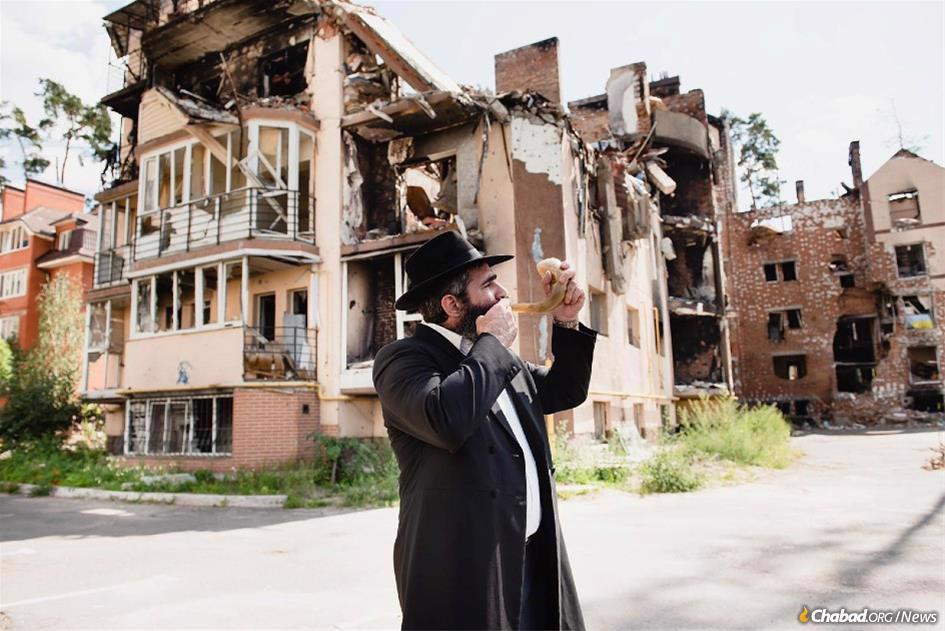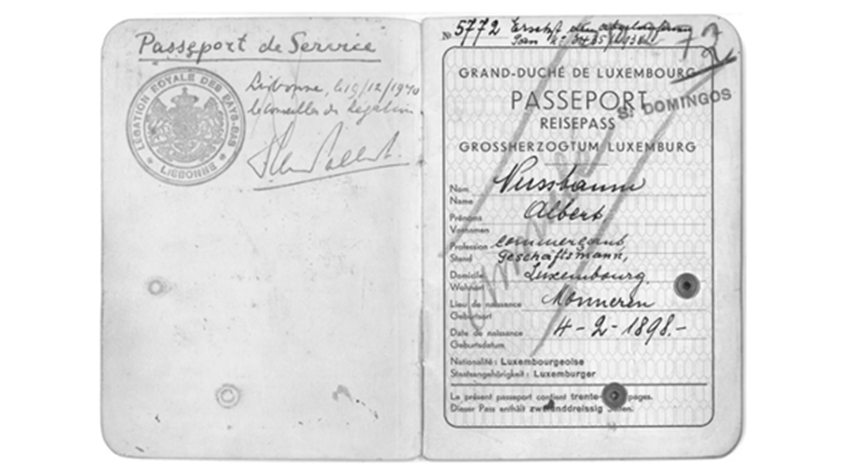Rabbi Yehoshua Vishedski, who works on the Vaad HaKashrut of Ukraine supervising production of kosher food in the war-torn country, blows the shofar duringthe month of Elul.
By Faygie Holt
A new food-relief program by Chabad-Lubavitch to manufacture, produce and bake kosher foods within Ukraine will ensure that Jews will have a sufficient supply of items when they sit down to their Rosh Hashanah and Sukkot holiday meals. Funded by the Jewish Relief Network Ukraine (JRNU), the program represents a shift from kosher food imports to local production that comes in response to wartime disruptions in the kosher food supply.
In Krasylivka, a village outside Kyiv, Chabad rabbis from the region have arranged for a special production run of 15,000 bottles of kosher honey—one of the key essentials to any meal on Rosh Hashanah, which begins this year on the evening of Sept. 15 and ends after nightfall on Sept. 17. Each bottle bears a sticker in Ukrainian wishing the recipient a shanah tovah, a “good year.” Literally, tons of kosher honey cookies are also being baked in the city.
In other towns across Ukraine, Chabad rabbis are supervising the production of kosher chicken, beef and other items.
“We have big freezers and have been working since after Passover to prepare the items,” said Yehoshua Vishedski, who works on the Vaad HaKashrut of Ukraine with his cousin, Rabbi Pinchus Vishedski, director of Chabad-Lubavitch of Donetsk. “We would do one round of ritually slaughtering the chicken, then another, then the beef. Then, when the time was right, we sent it out.”
According to Vishedski, they sent out an estimated 25 tons of chicken, eight tons of meat, nine tons of milk, half a ton of hard cheese, 200 kilos (440 pounds) of butter, 3,000 packages of mayonnaise and 3,000 packages of ketchup.
Shifting from imports to preparing the food locally has not been easy, he said. First, there were problems with electricity. And with Ukrainian men serving in the army, there were not enough people to work in the factories. Also, some of the rabbis who would generally supervise the factories are currently not in Ukraine.
50,000 to receive humanitarian aid
In total, an estimated 50,000 people will receive food and other humanitarian aid in advance of Rosh Hashanah, produced and distributed through the Jewish Relief Network Ukraine (JRNU), Chabad’s boots-on-the-ground aid network of emissaries and volunteers. Some of the recipients—particularly, the infirm or elderly—will receive food that can be prepared at home, including basics like buckwheat kasha, pasta and rice. Thousands of others, however, will be partaking in communal holiday meals at their local Chabad House or synagogue.
“We have trucks crisscrossing the country—Kharkiv, Dnipro, Odessa, going all over—to ensure that the people coming to synagogue will have good holiday meals and access to food that adheres to the highest standards of kosher,” said Rabbi Shlomo Peles, executive director of JRNU.
Manufacturing kosher food in Ukraine not only instills local pride but aids the country’s struggling economy as well.
“We want to help the local communities,” Peles said, “and we are always thinking of how we can get people back to work and make things close to normal, and this is part of it. It’s also why we are making sure our schools reopen this year—some in person, some online, depending on where they are—because we want the children to feel as normal as possible.”
It is a somewhat new normal as the country continues to be in the midst of war, and people have found ways to adapt. In increasing numbers within the Jewish community, that means reconnecting to their heritage.
“Jews who before the war had never visited a synagogue or a Jewish community center have started coming to our services because they feel that in a time of war, the key place to be is surrounded by community,” he said. “What people outside of Ukraine need to know is that all the synagogues, all the Chabad Houses, will be open in Ukraine with full prayer services and full communal meals. We have to make sure that the Jews in Ukraine feel exactly the same way Jews in Israel and the United States and around the world feel on Rosh Hashanah.”
‘It’s life-changing’
According to Judi Garrett, the JRNU’s COO, at the onset of the war, Chabad in Ukraine was providing humanitarian aid to some 30,000 people. Today, that number is 50,000 and rising.
“The Chabad emissaries and the volunteers on the ground are helping so many people with the most basic of needs,” she said. “It’s life-changing.”
Like Chabad emissaries across Ukraine, Rabbi Moshe and Miriam Moskovitz—who have been leading Chabad of Kharkov for some 30 years—have been distributing humanitarian aid and helping people with all kinds of needs—food, medicine, heaters, clothing—and that continues even as they prepare to serve communal meals to some 500 people on Rosh Hashanah.
“It is actually very sweet that the honey we will be serving is being made in Ukraine,” said Miriam Moscowitz. “This is the second Rosh Hashanah of the war, and I think it just makes it more special that we should have a sweet year and that we should have much better times as a result of our own efforts.”
Aid continues to come in from outside Ukraine to help offset the costs of these endeavors is crucial.
Moskovitz noted that “the news has moved on, but the fact that Jewish people all over the world are still rallying to help and to keep helping the Jews in Ukraine who are going through a very difficult time, that is extremely encouraging.”
Rabbi Avraham Wolff, director of Chabad of Odessa, notes that their goal this year, and every year, is that all members of the Odessa Jewish community celebrate the holiday traditions, ceremonies and spirit.
“During these challenging times, the support of the community means even more to the people, and the rituals and customs bind us ever closer together,” said Wolff.
“The massive aid trucks that are reaching Jewish communities across Ukraine bring so much more than food and gift boxes—they bring joy and hope to people who have lost so much. We pray for peace in the new year.”
Credit: Chabad News


































